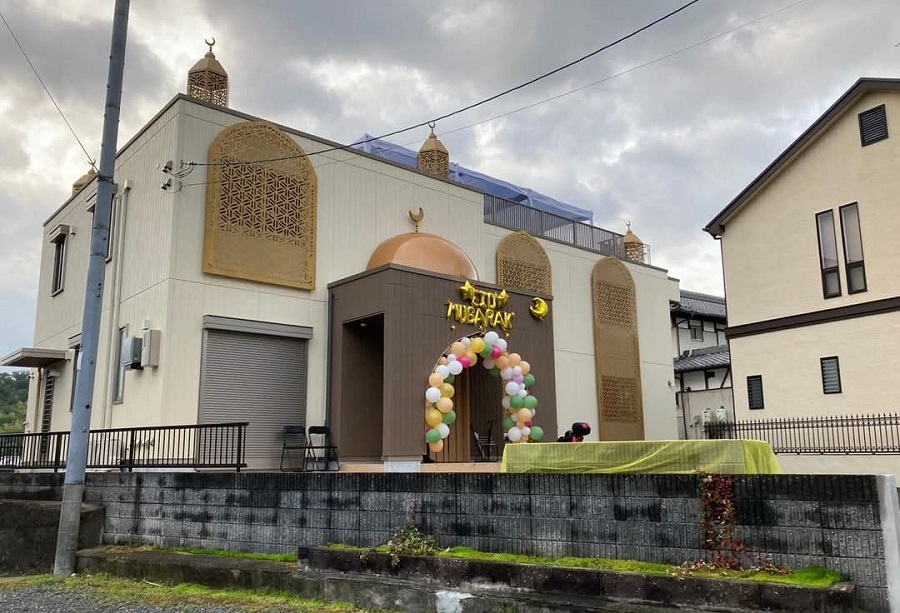
Published :
Updated :

Japan's Eid celebrations have become more well-known in recent years. For the Muslim community, this is more than just a festival. Celebrating Eid abroad can be a wonderful and unique experience. Although it differs from how we celebrate it in Bangladesh, it can also be an opportunity to learn and experience new traditions and cultures.
Festivity begins at Chandraat
On Chand Raat, the night before, the excitement of Eid begins. Mehendi (henna) designs are applied to the hands of women and children, a beloved custom that binds them to their cultural heritage.

Osaka's Ibaraki Mosque shows children creating origami and writing "Eid Mubarak" in colourful pieces.
Strangers give each other warm embraces, and friends welcome one another with warm hugs. Everyone rushes through last-minute preparations for the big day.
Friends and families give each other presents with good wishes; the room is filled with their laughter.
Eid prayers across Japan
Eid prayers are central to the celebration, with congregations gathering at major mosques such as Tokyo Camii, Kobe Mosque, Nagoya Mosque, and Osaka Ibaraki Mosque.
Bangladeshis congregate at Osaka Ibaraki Mosque in large numbers, and the area is filled with colourful traditional attire. Hugs while wishing "Eid Mubarak!" fill the air, making the Eid ground homely. Curious locals often join in.
After the prayers, participants are offered great meals, usually traditional specialities. Following the Eid prayers at Ibaraki Mosque, another famous custom begins. A food cart appears, packed with excellent Middle Eastern and South Asian foods, including luscious kebabs, Savory shawarma, and delicate Indonesian pastries.
The aroma of spices and grilled meat fills the air as families and friends share morsels of their favourite meals while conversing and offering warm greetings. It is a fleeting and fabulous moment before everyone travels to their respective destinations, carrying the spirit of Eid with them.
However, many Muslims have to carefully juggle their festivities with job or school obligations because religious festivals are not recognised in Japan as public holidays.
Somaiya Akter Riya, an English teacher at a Japanese public school, has lived in Japan for some time. She shares the challenges of balancing work and celebrations on Eid.
"On the one hand, I'm getting ready to leave for work; on the other, I'm trying to be a good host. It's not always easy, however, managing it anyway," she says. Many people take the morning off when Eid falls on a weekday, going to prayers and spending time with their loved ones before returning to work or school by midday.
Attending local Eid gatherings and outings
Local Bangladeshi families throw little get-togethers throughout the day, with home-cooked meals of classic fare like beef curry, roast meats, jarda, and biryani. Often modest, the houses turn like a miniature Bangladesh in the middle of Japan.
These intimate yet modest get-togethers foster a feeling of connection and community. Even though many of them are far from home, the delight of sharing food, tales, and laughter makes it feel like family. Mohammad Ashraful, an engineer working for a Japanese company, shares his experience. "It's not always easy to find halal food here, but things are changing," he says. "Japan is becoming more aware of Muslim festivals and culture, thanks to the growing Bangladeshi community, especially in cities like Osaka, Kobe, and Nagoya.

Cherry blossoms now give the ceremony an additional festive touch as spring spreads throughout Japan. The sight of pink petals drifting in the air adds a lovely touch to Eid celebrations, and the mild chill in the air makes family get-togethers even cosier. Many families go to parks and gardens in the afternoon, dressed in their best traditional attire (men in clean kurtas, women in vibrant salwar Kameez), and take pictures under the Sakura trees. As the colourful tradition of Eid meets the beauty of the cherry blossoms, it's a charming moment where cultures collide.
An occasion for cultural fusion
Beyond the celebrations, the blending of cultures is becoming more evident each year. Japanese culinary customs have impacted some Bangladeshi families' Eid celebrations, with traditional Eid fare occasionally appearing alongside sushi, tempura, and Japanese-style desserts.
Similarly, Bangladeshi families are encouraged to incorporate outdoor celebrations into their traditions by the Japanese love of seasonal aesthetics, such as hanami (flower watching), which perfectly complements the joyous atmosphere of Eid. In addition to enhancing the Eid experience, these cultural interactions help Bangladeshis in Japan feel more a part of the country, transforming Eid into a festival that celebrates variety and cuts across boundaries. Halima Khatun, a graduate student at Osaka University, celebrates Eid in a unique way far from home. "My Japanese friends often join me for Eid gatherings, and it's amazing to see their growing interest in Bangladeshi traditions," she says. She also loves how cultural expression sparks curiosity. "Whenever I wear Bangladeshi ethnic dresses, I get compliments from random people on the streets. They admire our food and vibrant fashion."
Eid in Japan is a lovely fusion of new experiences and long-standing customs for the Bangladeshi minority. Although there aren't any formal public holidays to commemorate the event, the essence of Eid endures. In a distant place, these little get-togethers, neighbourhood activities, and times spent together provide a feeling of home. No matter where it is, whether in Japan or Bangladesh, Eid is Eid. The traditions may differ, but the spirit of joy, togetherness, and celebration remains the same.
saptaparna.cbga@gmail.com


 For all latest news, follow The Financial Express Google News channel.
For all latest news, follow The Financial Express Google News channel.